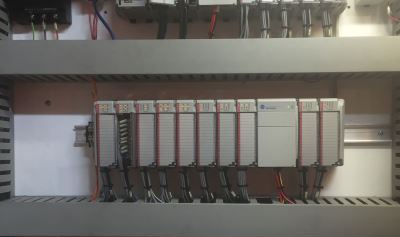PLCs (Programmable Logic Controllers) are the purpose-built computers that control the Plant. They monitor and activate devices in a controlled safe manner. The connections to devices can be dedicated (hard-wired) or by networks such as CANBus or DeviceNet.
For Example
A start/stop button is wired to the PLCs’ digital inputs and a corresponding motor starter for a water pump is wired to the PLC’s digital output. The PLC can be programmed and emulated to control the starting and stopping of the motor safely and accurately. It can then be programmed to automate specific operations, such as starting the motor when the water level is low and when conditions are safe to do so. It can also be programmed to stop automatically for example before a dangerous situation arises or at 5:00pm every day.
Many operators consider the PLC as a mysterious black box that has a mind of its own. PLCs are often programmed in a way that assumes everything is running smoothly; as such, they don’t handle abnormal circumstances well. At Mescon, we reduce the mystery by programming in a robust manner that ensures the machine operates smoothly. When things go wrong (e.g. a sensor gets knocked and no longer detects product), you need to be able to diagnose this quickly and rectify the situation. When you don’t have to look inside the PLC to know what is happening, you will be able to rectify many issues yourself, therefore reducing the number of callouts you will need to make. This will save you, the customer, time and money.
At Mescon we produce robust and easily diagnosable PLC programs through:

Mescon has several years’ experience over a multitude of PLCs, mostly programming in ladder logic, but we have also used Flow Chart, Statement List, Function Block and Sequential Function Charts. Each PLC manufacturer has their own unique ‘features’. We regularly program the popular brands such as Rockwell, Omron and Schneider, but we have also programmed less common varieties such as Toyo, Honeywell, Hitachi, Mitsubishi, Texas Instruments, Siemens, and Horner.
Prior to commissioning, our PLC programs undergo simulation and testing to ensure they operate on site as intended. You can be confident that the PLC software is acting as described and agreed. Many clients undergo FAT (Factory Acceptance Testing) with the PLC and SCADA system to verify that operations occur as expected. This gives the end client the confidence that the software and the graphics are telling a true story. It removes a lot of mystery and unnecessary fault finding during commissioning. Factory Acceptance Testing includes simulation of feedback and normal operation. Within the FAT or simulated environment, it is possible to see your plant running before it goes live. This allows you, in a timely and safe manner, to identify shortcomings in design and operation, and even test scenarios without affecting equipment operations.